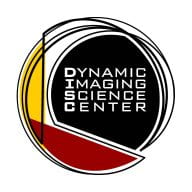 Magnetic Resonance Imaging (MRI) is a safe technology.
Magnetic Resonance Imaging (MRI) is a safe technology.
The magnetic fields employed in scanning do not involve ionizing radiation and do not interfere with biological function. The primary hazard comes from the strength of the magnetic fields involved.
MRI uses very strong magnets.
Magnetic field strength is measured in units called Tesla, and DISC houses a 0.55 Tesla scanner. A 0.55 Tesla magnet’s field is roughly 10,000 times the strength of Earth’s magnetic field, and roughly 500 times as strong as a common refrigerator magnet. For this reason, metallic and ferromagnetic objects and devices pose a serious hazard if brought near the scanner, which would exert a strong attractive pull upon them. The field would also likely erase credit cards, bank cards and other forms of magnetic encoding.
Metal and magnetic objects must be kept away from the scanner.
Access to the areas affected by the magnetic field is restricted, and safeguards are in place to ensure that no metal encounters the field. The person conducting your study will provide you with additional information and answer questions you may have. All scan participants, and those personnel conducting the scan, must remove all ferrous metal from their bodies, pockets, clothing etc before entering the scanner room.
Radiofrequency and magnetic field gradients can interact with tissues and objects.
There is a risk of heating from radiofrequency imaging coils, the cables of radiofrequency imaging coils, and/or the cables from monitoring devices. Please report any heating/burning sensation immediately.
There is a possibility that you will experience a localized twitching sensation due to the magnetic field changes during the scan. This is not unexpected and should not be painful.
Dizziness and nausea may occur momentarily when your head is moved in or out of the tunnel of the magnet. The sensation should disappear quickly. If not, you may discontinue scanning at any time.

